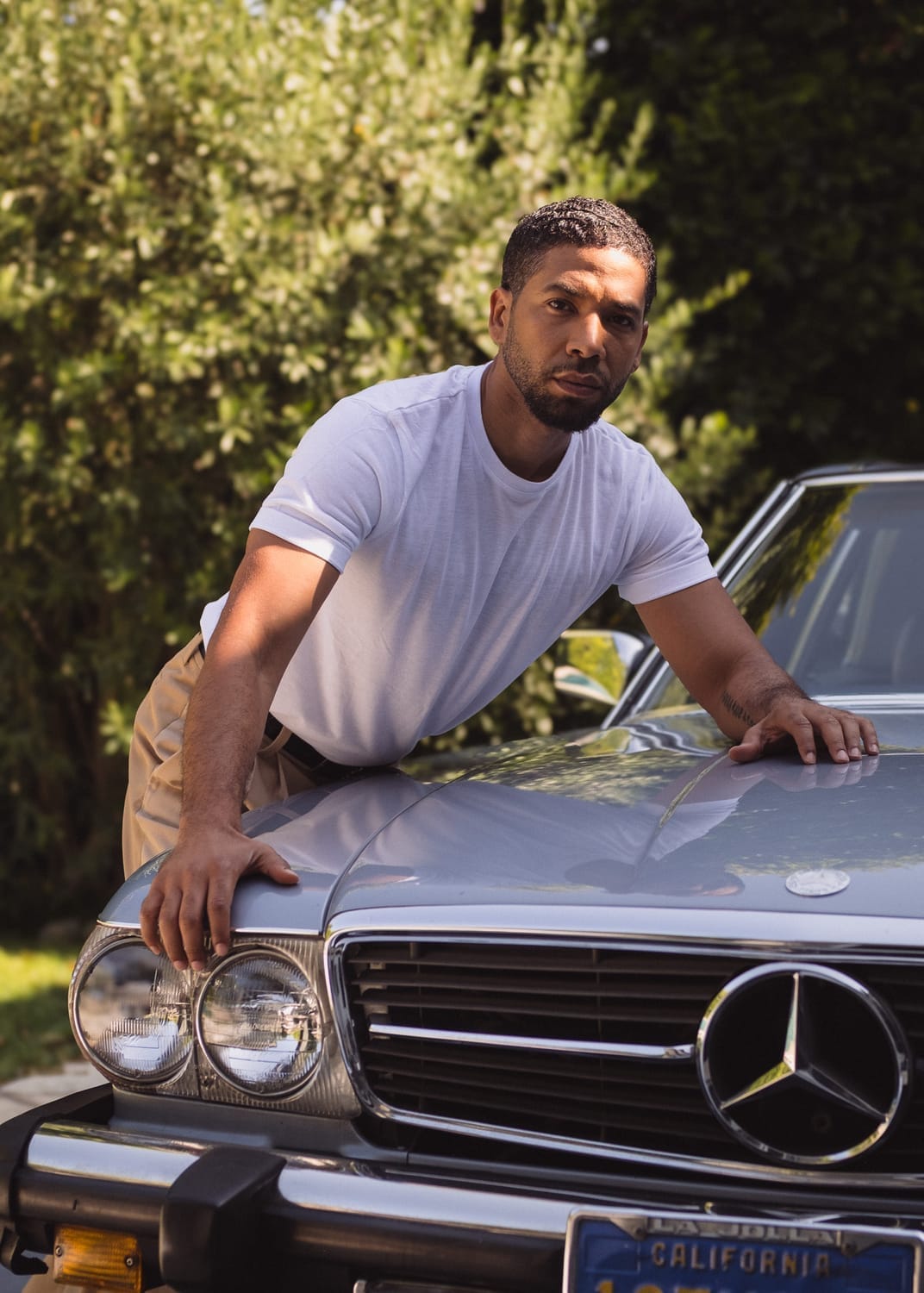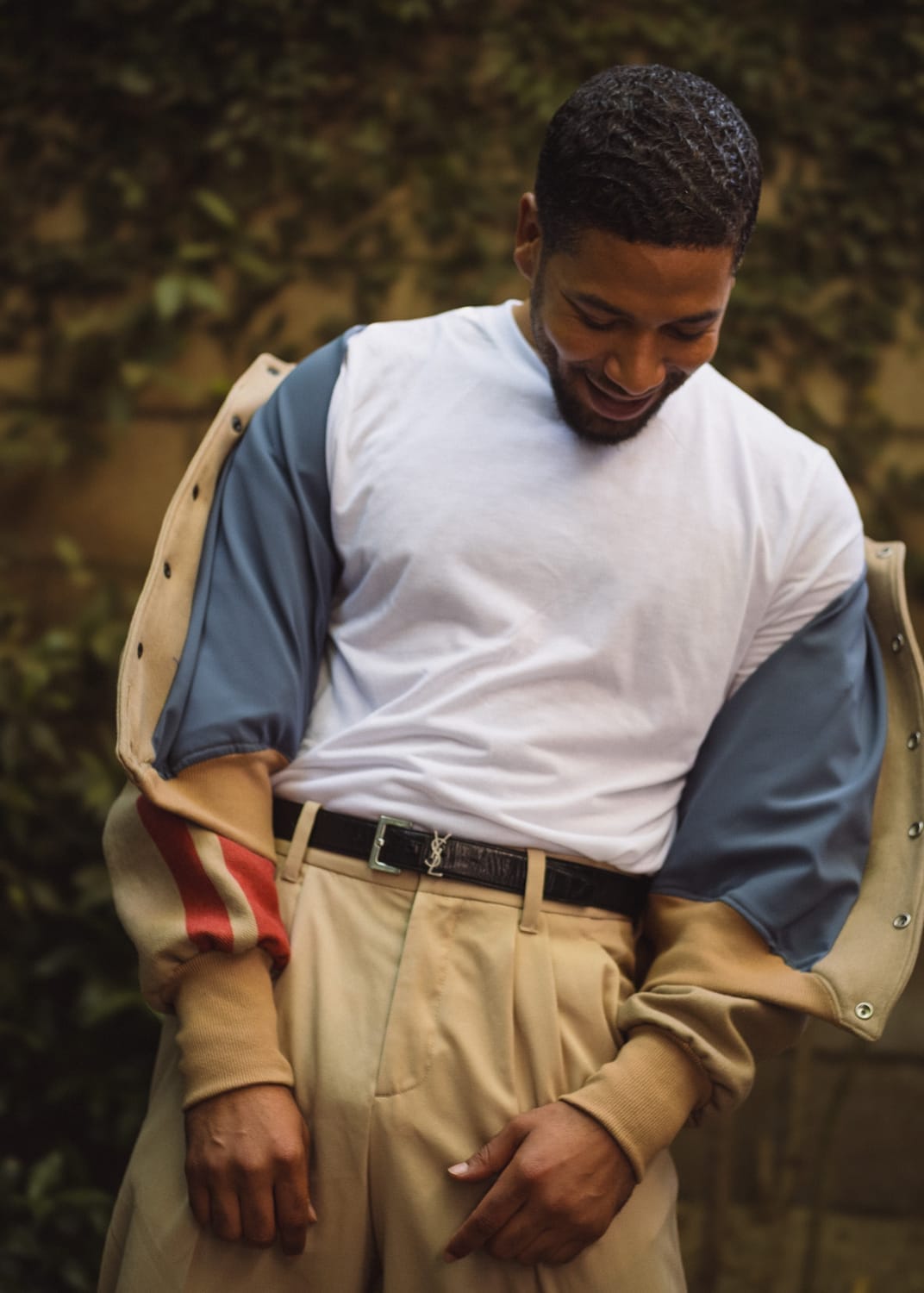ALPHA
MAGAZINE
Jussie Smollett: A Candid Conversation on Directing, Acting, and Mental Health in the Black Community
written by
CLINT PORTE
"Those are your people", the clear-eyed, rejuvenated Smollett declared to ALPHA Magazine. I used to pray for humility all the time, now I pray for discernment. Once you recognize you only need relationships where there is no ego in it...those are your people."
In an exclusive sit-down interview with actor and director Jussie Smollett, we delved deep into his latest project, “The Last Holiday,” a film that not only showcases his talent both in from of and behind the lens, but also serves as a poignant exploration of what family personally means to Jussie. The standout child actor, now in his mid thirties and with a bevy of life experiences under his belt, Smollett, who gained widespread acclaim for his role in the television series “Empire,” has ostensibly grown into someone who celebrates his the people who continue to pour life into him.

“The Last Holiday” is a a narrative about an estranged mother (Vivica A. Fox) who travels to Los Angeles to bury her deceased son, played by the talented Jabari Red, from whom she was separated for years. Upon arriving in Los Angeles, she meets her son's widow - his husband - for the very first time and learns he has lived a very different lifestyle from what she could imagine.
Fox, Smollett's, powerful co-star, whom he describes as "one of the most unselfish scene partners he's ever had," who also someone who Smollett was very familiar. Smollett's sister, Jurnee, played with Fox on the show, Out All Night, which soon after connected the two families for life. From the time, he was 9, Jussie and Vivica have built a close bond, up to the first where she starred in the first episode of Empire that Smollett ever directed.
"I already knew what it was like to know her and to love her, and to work with her...but I had never had a real scene with her. She's one of the most powerful scene partners that I have ever had." Such lofty praise from Smollett was not wasted, as Fox's presence on screen commanded the attention of everyone in the theatre in The Lost Holliday.
Such performances were prevalent throughout Smollett's sophomore film. Dealing with theme's of grief, identity and forgiveness, the actors knew they shouldered the burden of delivering powerful emotions on screen.
Most potent or emotionally difficult for Jussie were the scenes with Londyn Carter, his real-life nieces best-friend. Looking into her eyes, he felt the real-world trauma of children dealing with the way the grief affects children. "I was not supposed to be emotional during those scenes, but I found myself getting choked up."
For Smollett, surround himself with familiar people - familial people - created a thematic unity from beginning to end. The people closest to Smollett helped him to deliver a special performance and delivery the kind of emotionally grounded story he wants to world to experience.


Addressing Mental Health: A Critical Conversation
"How do you tell somebody that you need help, when they simply think that you shouldn't? What do you do? Who do you talk to?"
Central to our discussion was the topic of mental health, particularly as it pertains to Black boys. Smollett shared his concerns about the stigma surrounding mental health in the Black community and the urgent need for open dialogues. “The idea that there's only one way to be a man, let alone a black man in this country, let alone the world, is something that's choking us, and it has been for some time."
Smollett’s passion for this cause is palpable, and he articulated a vision for a future where mental health dialogues become more open. “What I'm grateful for is that As black folks, as black men starting to talk about all of the different layers and nuances that go along with this, that we should've never been ashamed to talk about to begin with." ‘The Lost Holliday’ is a step towards that, showcasing characters who confront their struggles and find strength in vulnerability. "I should say, we've always expressed it within our own communities, but it becomes really difficult sometimes when the community becomes bigger...remember when your mom used to say back in the day, 'we don't talk about that in mixed company?' Well what does that mean, because now, there's no place to go where it's not mixed company."
The Importance of Storytelling as a Vehicle for Healing
In “The Lost Holliday,” Smollett’s character embarks on a transformative journey that mirrors the challenges faced by many young Black boys today.
"How do you tell somebody that you need help, if they simply think that you shouldn't? Who's there to tell you that you're ok as you are if the very people who are supposed to be telling you that don't believe that you are ok as you are?" Smollett iterates that his sentiment encompasses matters of education, identity, religious beliefs, sexuality, race and other issues.
Through the artistic expression of his acting and directing, Smollett hopes the films he creates - pictures that are more like vignettes or snapshots into certain segments of life - will elucidate the core issues about which he is passionate.
"What I want anybody to take away from watching me is...ownership
"Especially over the years, it has been my fear of rejection that has pushed me to work at it even if I had to do it alone...and then you look back behind your shoulder and you realize that you weren't along at all...that the people that were there, that's your community.
“Art has a unique ability to connect us and facilitate understanding,” he explained. “When we tell stories that resonate with our experiences, we create pathways for empathy and dialogue. I hope that audiences will leave the theater feeling seen and understood, and inspired to engage in conversations about their own mental health.”
"To me, that is my strength...is being able to acknowledge when something is not right, but more importantly, when I'm not right. Staying true to yourself and that you are not looking at yourself through the eyes of other people.
Empowering the Next Generation
Smollett’s commitment to empowering the next generation is evident not only in his film but also in his advocacy work. He has been actively involved in initiatives aimed at promoting mental health awareness and providing resources for young people. “It’s important to me to give back to the community that has shaped me,” he said. “I want to use my platform to uplift others and ensure that young Black boys know they are not alone in their struggles.”
As we wrapped up our interview, Smollett’s passion for his craft and his dedication to meaningful change shone through. “Creating ‘The Lost Holliday’ has been a labor of love, and I hope it resonates deeply with viewers,” he concluded. “If we can start conversations and inspire change, then I’ll consider this project a success.”
A Vision for Change
Jussie Smollett’s journey as an artist and advocate is a testament to the power of resilience and the importance of mental health awareness in the Black community.

“The Lost Holliday” is more than just a film; it’s a beacon of hope that encourages young Black boys to embrace their emotions, seek help, and understand that their stories matter.
As the film prepares for release, Smollett continues to advocate for positive change, reminding us all of the vital role that empathy, understanding, and storytelling play in healing and empowerment. In a world where mental health conversations are increasingly necessary, Smollett stands at the forefront, championing a future where every voice is heard and valued.
YOU MIGHT ALSO LIKE
RESOURCES
LOS ANGELES, CA
